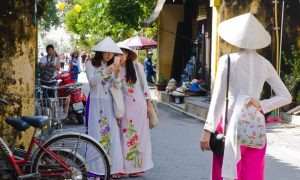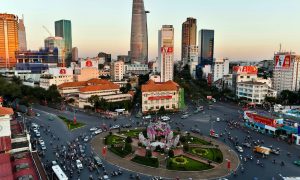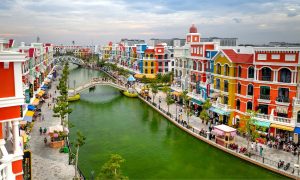In recent years, Vietnam has capitalized on itsLow cost of living, pleasant climate, rich culture and fast growing economyThe ideal for a growing number of retireesimmigrantsDestination. Whether you are looking for a relaxing retirement or want to start a new chapter of your life in a vibrant country, Vietnam offers a wide range of options and opportunities for expat retirees. This article will take an in-depth look atVietnam ImmigrationRetirement visaspolicies and how to retire comfortably in this fascinating country.
I. Vietnam's retirement visa policy
Compared to other Southeast Asian countries, Vietnam's retirement immigration policy is relatively simple and suitable for many expatriates wishing to spend their twilight years in the country. While Vietnam does not currently have a specific "retirement visa", there are a number of existing visa categories that expat retirees can use to achieve long-term residency. Common retirement visa routes includeTemporary Residence Visa (DT Visa) and Tourist VisaThe method of application will vary depending on individual circumstances.
1. Temporary residence visa (DT visa)
Vietnam's **Temporary Residence Visa (DT Visa)** is available to foreigners who invest, work or engage in business activities in Vietnam. Although this visa is not exclusively for retirees, it is possible for retirees who wish to invest or open a small business in Vietnam to obtain permanent residence through this visa.
-
Visa requirements: Proof of financial capability, such as bank deposits, regular income, etc., is usually required to ensure self-sufficiency and non-dependence on public resources in Vietnam.
-
Visa Duration: Temporary residence visas are usually valid for one year and can be renewed.
2. Tourist visas
For many retirees who wish to stay in Vietnam for a long period of time.tourist visaThis is one of the most common options. Tourist visas are valid for a shorter period of time, but it is possible to extend your stay in Vietnam by applying for a "visa extension" each time you enter the country. Often, expatriates spend time in Vietnam in this way to enjoy a stress-free retirement.
-
Visa requirementsYou can apply for a tourist visa for 3 or 6 months, extend your stay by applying for an extension or re-entering the country across the border.
-
Visa Advantages: Tourist visas are relatively easy to apply for, do not require too many supporting documents and are highly flexible.
3. Marriage visas
If you are married to a Vietnamese citizen, you can apply for long-term residence. Vietnam's marriage visa allows foreign spouses to settle in Vietnam and enjoy a more convenient residence.
-
Visa requirements: Proof of marriage and proof of health of both parties is required, as well as usually proof of your financial independence.
-
Visa Advantages: Marriage visas are more stable and facilitate long-term settlement.
II. Cost of living and retirement environment in Viet Nam
cost of living
The cost of living in Vietnam is very low, especially when compared to Europe and the US. Whether in Ho Chi Minh City, Hanoi, or the beautiful seaside cities of Da Nang and Nha Trang, expatriates can enjoy good value for money.
-
shelter: Rents in first-tier cities are relatively reasonable, for example, in Ho Chi Minh City, a 1-bedroom apartment rents for around US$200-500. Even for high-end apartments in the city center, rents are usually around US$800-1,000.
-
foodstuffs: Food consumption in Viet Nam is also very cheap, especially street food, which usually costs less than US$5 per meal. Shopping at supermarkets and eating in restaurants is also relatively inexpensive.
-
health care: Vietnam's healthcare system is gradually improving, especially in big cities where many modern private hospitals provide quality medical services. The cost of medical care is much lower than in Europe and the United States, with the cost of a regular outpatient visit ranging from about 10-30 USD. For long-term expatriates, purchasing health insurance is a good choice.
Pleasant climate and natural environment
Located in the tropics, Vietnam enjoys warm temperatures throughout the year, making it particularly suitable for retirees who enjoy sunshine and beaches. Ho Chi Minh City in the south has a hot and humid climate, while Hanoi and other cities in the north have a relatively mild climate for those who don't like extremes.
-
natural landscape: Vietnam is blessed with beautiful beaches, lush forests and magnificent mountains. You can choose to settle in small coastal resort towns such as Da Nang or Nha Trang to enjoy the serenity of beach life.
-
outdoor activity: Sports and recreation are also very important in retirement life, and Vietnam offers a rich choice of outdoor activities for retirees, including hiking, trekking, swimming, diving, etc., especially in those seaside cities.

III. Social welfare and medical care in Viet Nam
social welfare
Although the social welfare system in Viet Nam is not as comprehensive as in Western countries, the Vietnamese Government has strengthened its care for the elderly in recent years. Community activity centers for retirees have been set up in some major cities, providing a variety of services such as fitness, recreation and language learning.
medical protection
Vietnam's healthcare system is gradually modernizing, especially some private hospitals with very high quality medical services. For retired migrants, it is recommended to take out private health insurance to ensure access to quality healthcare.
In larger cities, such as Ho Chi Minh City and Hanoi, medical facilities are better and most international hospitals offer services in English.
-
Insurance advice: You can choose a health plan that includes medical and accident insurance so that you can enjoy high quality medical coverage including private rooms, emergency services and more.

IV. Cultural and lifestyle adaptation
Language and culture
The official language of Vietnam is Vietnamese, and although English is spoken more frequently in some major cities, most Vietnamese do not know English. Therefore, it is beneficial to learn some basic Vietnamese, especially for retired people who need to communicate with locals on a daily basis.
Vietnamese culture is heavily influenced by Confucianism and emphasizes traditional virtues such as family, respect for the elderly and love for children. Expatriate retirees can gradually integrate into Vietnamese society through interaction with local residents. At the same time, Vietnamese communities are very friendly and there is a high level of acceptance by expatriates, especially in the more cosmopolitan cities such as Hanoi and Ho Chi Minh City.
V. Summary:Immigration to VietnamIs it suitable for retirement?
Vietnam is a great country for retirees to settle in, especially for those who wish to enjoy a low cost of living, a warm climate and a simple life. Although Vietnam's retirement visa policy is not as specialized as some countries, with the right visa route and proper planning, expat retirees are well positioned to enjoy their old age in Vietnam.
-
low cost of living: The cost of living in Vietnam is ideal for retirees and can provide you with cost-effective living conditions.
-
Pleasant climate: Vietnam's tropical climate is perfect for retirees who love sun and beaches.
-
Medical and social benefits: Vietnam's healthcare is modernizing and inexpensive, making it an ideal choice for expat retirees.
If you are planning to spend your retirement in a vibrant yet low-cost country, Vietnam is certainly a good choice.






